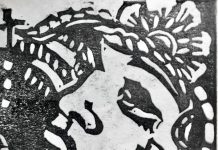What, in the end, are we to make of the apostle Paul? Luke, who loves him, is not shy about telling us of Paul’s occasional foolishness and blind spots. Paul has been converted, but like any convert, the old self still shows up with dispiriting frequency. Recently I had a chance to chat with the psychologist and author Kevin Anderson, who told me that he tries to avoid using the word “ego” in his work. Instead he talks about the small self and the large self. The small self is what I’ve been referring to as the ego up until this point (although now, thanks to Kevin, I’m going to change my language). The large self is the transformed soul, in harmony with God and all of creation. It is Paul’s small self that led him to appeal to the emperor when the crowd was threatening him outside of the barracks in Jerusalem. It is the large self that saw Christ on the road to Damascus. Even at this late moment in our story, this moment that is near to Paul’s death, both selves are still fully operative.
Which leads me to some final thoughts on the transformed self and the very process of transformation. I have talked about how Jesus’ main purpose on earth was to lead people into transformation, with the understanding that transformed selves will be able to aid the repair of the world. Since the beginning of Acts, I’ve talked about how, after Jesus ascended, his followers attempted to create communities that could foster transformation and cultivate the large self. And throughout this entire journey, my not-so-secret spiritual companion has been Teresa of Avila, and her book The Interior Castle.
So I’m going to give Teresa the final word on transformation. The Interior Castleuses the metaphor of a castle with seven rooms to describe the spiritual life, and the metaphor is crucially important. We can easily translate it into our own lives by thinking of it as a house, rather than a castle. Oddly enough, at the moment I do live in a house with seven rooms – two bathrooms, three bedrooms, a kitchen area, and a living room. Throughout the day, I wander from room to room. Teresa’s metaphor is a little different, in that not all of the rooms of the interior castle are accessible until God’s grace opens the door to them. But once all the doors are open, she assumes that the soul will wander in and out of different rooms throughout the course of a day, just like I do. Even the person who has entered the seventh dwelling, where the soul rests entirely with God, will frequently mosey out of that dwelling and into the first dwelling, there the little skittering creatures of pride, insecurity, vanity, and shame are as common as dust bunnies. No soul lives within the large self all of the time.
In her section on the seventh dwelling, Teresa doesn’t spend a great deal of time describing union with God, which is, as she freely admits, indescribable. Instead, she muses over how the soul can live in the world after being transformed. She writes:
You may think that an experience like this would propel the soul beyond herself, that she would become so absorbed that she could focus on nothing else. Actually, when it comes to doing anything relating to serving God, she is more present than ever before. As soon as she finishes such a task, she rests again in that divine companionship. In my opinion, as long as the soul does not give up on God, he will never fail to make his presence known to her in a clear way. The soul has grown confident now that God will never leave her. He has granted her this incredible favor, hasn’t he? Why would he allow her to lose this precious gift? […]
If her consciousness of the divine companionship were always that intense, she would never get anything done! It would be impossible to think of anything else or to function and live among other human beings. Yet even if the light of this presence does not always burn quite that clear and bright every time the soul checks, that sweet friendship is there.
The transformed soul, then, is not in a constantly blissed out and otherworldly state. Instead, the large self is so well known, so alive and constant, that as soon as we slow down and reach out to the divine, the small self can fall away.
In this way, the spiritual life really is a practice. I learned to play guitar when I was nine, and have been playing it ever since, without ever really becoming very good. But I enjoy playing it from time to time. Sometime a year will pass when I don’t pick up my guitar at all. Yet as soon as I pick it up, the fingers of my left hand stretch into the appropriate chords. The knowledge of how to play is part of my body, now. It’s part of who I am. That is what the transformed self is like. Often in our daily lives we are beset with tasks that require us to walk around in different rooms of our metaphorical houses. Some of these rooms still have all the furniture of our small selves. But we can enter them without worry, because, when the little skittering beasts try to cause us fear and anxiety, we can simply cast our eyes towards the divine, and find that the music of our souls is still playing, that God’s sweet friendship is still reverberating within us.



